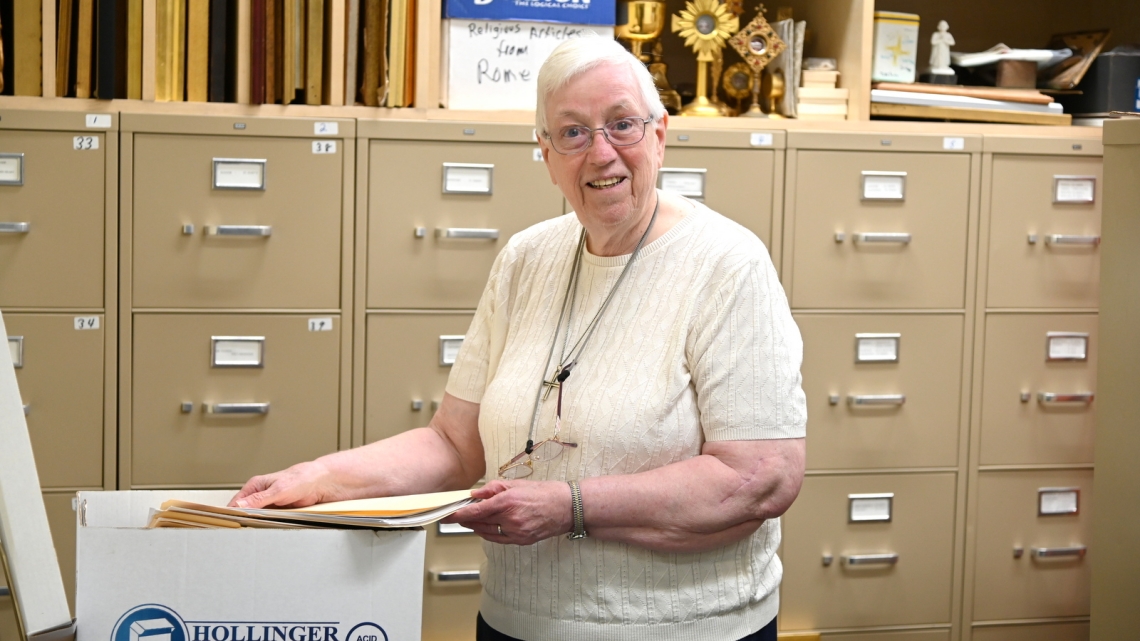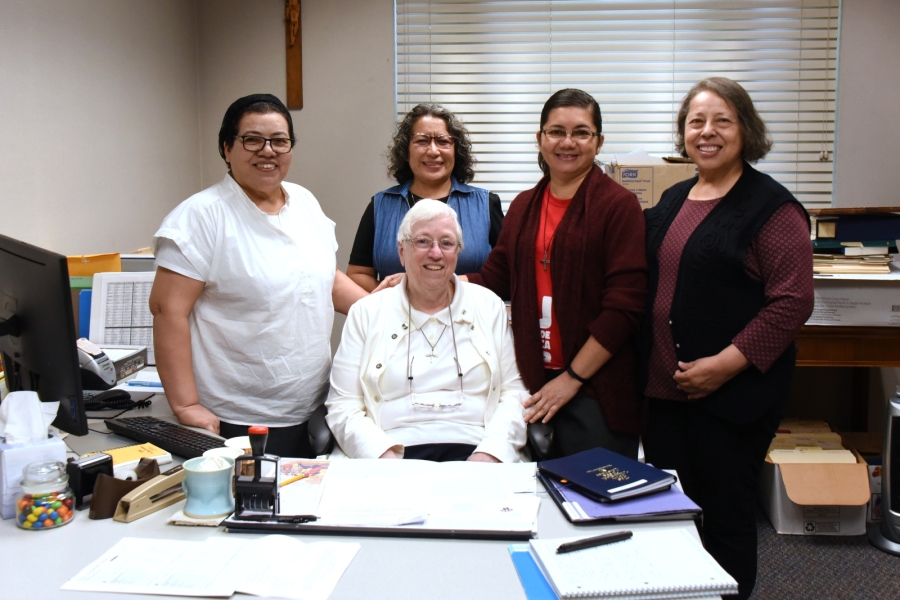Fifty years of faithful service and sacrifice

When Sister Rita-Mae Bissonnette, RSR, began working in the Diocesan Tribunal, it was supposed to be for five years. That five turned into another five, then five more. Now, 50 years later, she is still serving the Church in Maine.
“I’m still working for that five years,” she says, laughing.
Sister Rita-Mae’s work for the Diocese of Portland has spanned the episcopates of six of the diocese’s 13 bishops. She started during the episcopate of Bishop Peter Gerety, the eighth bishop of Portland, and then served with Bishop Edward O’Leary, Bishop Joseph Gerry, OSB, Bishop Richard Malone, Bishop Robert Deeley, and now Bishop James Ruggieri. After working in the tribunal, she was appointed vice-chancellor, then co-chancellor, and in 2008, chancellor and delegate for religious, positions she held until this past September, when she transitioned to working more limited hours in the diocesan archives.
“For 50 years, Sister Rita-Mae has been at the heart of the diocese. Particularly in her many years as chancellor, she has been the right hand of the bishops. As one of those aided greatly by her devoted service to the diocese, I am grateful for the person that she is and the dedication she has shown to the Church,” says Bishop Deeley. “Her trust in the Lord Jesus is shown forth in her life and her care for the people of the Church. Though she will take a more relaxed schedule moving forward, I am grateful that we will continue to have her wisdom and experience to consult. It is a blessing that her kind presence and compassionate ear will continue to be a part of chancery.”
“Sister Rita-Mae’s service to the Catholic Church in Maine (and beyond) is of epic proportions. Her ministry epitomizes the truth that self-sacrifice brings forth new life. I have always been in awe of her heroic work ethic,” says Msgr. Andrew Dubois, pastor of St. Paul the Apostle Parish, who formerly served as moderator of the curia for the diocese. “She has an incredible ability to balance justice and mercy in the face of challenges, to share from her deep well of institutional knowledge and wisdom, and to be faithful not only to our diocese and six bishops but to her religious community, personal family, and coworkers as well.”
Growing up in Millinocket, Sister Rita-Mae did not aspire to work for the diocese. She was just attracted to the joy and lifestyle of the Sisters of Our Lady of the Holy Rosary whom she saw at church and had as teachers at St. Martin of Tours School.
“They all seemed to be happy and to get along well, and I just wanted to be a part of that,” she says.
When she was three years old, she remembers visiting the sisters, who wanted to dress her in their habit to show her parents.
“I was very, very shy as a kid, and I wouldn’t let them do it, but I said to myself, ‘Someday, I’ll wear that habit,’” she says.
She entered the community after graduating from high school in 1965 and professed her first vows in February 1968.
Sister Rita-Mae says she expected to be a teacher like most of her fellow sisters, but she came to discover that it wasn’t where she excelled.
“The sisters taught school, so I thought I’d be a teacher for the rest of my life. So, it was devastating for me when I entered a classroom and I realized I could not survive,” she says. “I just didn’t have the discipline needed with the students.”
She believes that was one of the reasons her name was submitted when the diocese reached out to religious communities, seeking someone to help in the tribunal, which is the ecclesiastical court of the Church. She also points to a comment she made back when she was in the novitiate at the motherhouse in Rimouski, Quebec. She remembers being frustrated that she wasn’t allowed to speak with the mistress of novices, one of the few sisters who spoke English, because the sister was participating in a General Chapter and was sequestered.
“They kept saying it was because of canon law, so I said, ‘Someday, I’m going to know what that damn canon law is about,’” she says, laughing.
She was selected for the position with the tribunal and enrolled at The Catholic University of America in Washington, D.C., from which she received a master’s degree in Church administration.
She was then appointed defender of the bond in the tribunal, which was groundbreaking for the Catholic Church because that position had never before been held by a layperson anywhere in the world.
“Bishop O’Leary wrote to the Vatican and asked for a dispensation for me to be a defender of the bond because, according to the law, it had to be a cleric. So, in 1976, Bishop O’Leary got that dispensation, and I became the first layperson, man or woman, to be a defender of the bond,” she says.
While Sister Rita-Mae says there was initial concern about how well she would relate to the priests, it wasn’t long before her role increased because just a few months later, Msgr. Amédée Proulx, who had been serving in the tribunal, was named auxiliary bishop.
“As soon as they found out that I knew what the questions were and that I could answer them, I was accepted and started making my reputation, I guess,” she says.
Her competence and work ethic continue to be admired to this day.
“Sister Rita-Mae has been the engine for forward motion in the diocese, sensitive to the needs of the priests and the parishes, encouraging cooperation in the offices of chancery for the service of the diocese, and strengthening the pastoral life of the diocese by her encouragement,” says Bishop Deeley.
“I am continually amazed at everything that Sister Rita-Mae accomplishes and has accomplished over decades. And she does it so quietly! She has been a tremendous support and help to the priests of the diocese all these years. I know they appreciate her greatly,” says Msgr. Marc Caron, moderator of the curia and vicar general.
“I think my father had a very strong work ethic, and I just absorbed it. I didn’t find it hard,” Sister Rita-Mae says.
In 1983, Sister returned to The Catholic University to earn a licentiate in canon law because it was then required to do the work she was already doing. Not long after that, Bishop O’Leary asked her to serve as vice-chancellor.
“It was like being an executive secretary to the bishop. I would do scheduling and correspondence and be present at meetings when he wanted,” she says.
She says she also saw herself as a bridge, helping people connect with one another or with the services they needed.
When Bishop Joseph was installed and was looking to name a new chancellor, he didn’t want to promote a priest above her, so he named her co-chancellor.
“I told Bishop Joseph that it didn’t matter to me. He could leave me as vice-chancellor, but he wouldn’t hear of it,” she says. “I always wanted to be of service to the diocese but never a hindrance. In fact, I used to tell Bishop Joseph every year, ‘If you need somebody else, you can always let me go.’ And he would say, ‘No, no, no.’”
She remembers fondly her time serving with Bishop Joseph, which included driving him to non-liturgical events because he was known to not have a great sense of direction.
“Bishop Joseph was a great spiritual director without even knowing he was being one. I loved traveling with him. He taught me the beauty of the Liturgy of the Hours,” she says. “The most precious gift he ever gave me was the four-volume set of the Liturgy of the Hours.”
Having worked under so many bishops, Sister Rita-Mae says she has always been impressed with how each one has picked up where his predecessor left off and moved the diocese forward.
“I always felt that the bishop that we got at the moment was the right person for the diocese. Bishop O’Leary recognized that something needed to be done to address the diminishing number of clergy, but he didn’t have the strength or the ability to do anything about it. Bishop Joseph came along, and I think he set a tone of spirituality for the diocese. He also began doing studies regarding the clergy, and he got to the point where there was a plan that needed to be carried out. Bishop Malone came and carried that plan forward and set up administratively the different clusters, and Bishop Deeley, through the [Catholic Leadership Institute] process, helped the clusters work together and helped team building.”
It was Bishop Malone who named Sister Rita-Mae as sole chancellor in 2018. She worked alongside Msgr. Dubois, who was appointed moderator of the curia.
“Thanks be to God who granted me the privilege of collaborating with and learning from her during my 15 years at chancery,” Msgr. Dubois says. “I will be forever indebted and grateful for sharing that ministerial experience with her.”
Others who have worked alongside Sister Rita-Mae feel similarly.
“The last 17 years that I have worked with her have been some of the best years of my life,” says Christine Pitteroff, executive assistant in the Bishop’s Office. “I have benefited from her knowledge, spirituality, humility, and many more wonderful qualities. She is one of the most intelligent and groundbreaking people I know, but being humble, she would never boast about her many accomplishments. I am blessed to have worked with Sister and cherish our friendship.”
Sister Rita-Mae credits friendships, such as the one with Christine, for causing the years to fly by.
“It’s the camaraderie, and the people, and the great liturgies. It’s the times we celebrated as a chancery group but also the common liturgies such as the Blue Mass, the Red Mass, the holy days. It’s very good, very enriching,” she says.
Not that there haven’t been challenges, most especially the cases of clergy sexual abuse. Sister Rita-Mae says at those times you have to turn to your faith.
“I think that’s when the strength of the Lord is with you,” she says.
Sister Rita-Mae says she has also drawn strength from the love and support she has received from her community. Through the years, she served on the regional council, as a delegate to the General Chapter, and as the current treasurer for the region.
“They really are my family. For instance, on Thanksgiving, I like to cook Thanksgiving dinner but to cook it for the sisters who want to be there because I feel that is my family. That’s where I want to be, and my own family has always understood,” she says.
Members of her family and her religious community were among those who gathered on October 10 to celebrate sister’s service to the diocese. The evening included Mass celebrated by Bishop Ruggieri and concelebrated by Bishop Deeley, who was the homilist. Those in attendance included Abbot Mark Cooper, OSB, from Saint Anselm Abbey in Manchester, New Hampshire, 40 priests, sisters from nine religious communities, current and former chancery staff members, and dozens of others whose lives have been touched by Sister Rita-Mae’s service.
“Her contribution to the bishops and the life of the diocese has been enormous. Our gathering this evening is a celebration of the grace of that work and its inestimable value to the good of the Church in Maine,” Bishop Deeley said.











